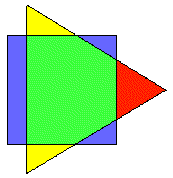
|
RNG: uniform
Computes a series of (pseudo-)random numbers from a uniform
distribution, by a selected RNG, 'random number generation', method. |
|
|
| Method |
midsq.
randu
congruential
"Fortran" |
Random number generator. |
| A, C, M |
|
Parameters: multiplier, increment, and
modulus. |
| .Seed |
(0, non-repeating) |
Seed for RNG, 0 to 231− 1
(≅ 2.147×109). |
| How many |
|
How many numbers to be computed. |
| Show all |
|
Shows all or only the first and last numbers. |
Computes ("generates") a series of (pseudo-)random numbers from a
uniform distribution (generally implicitly assumed). Pseudo-random
numbers are commonly simply called "random numbers". The methods are:
midsquare, randu, congruential, and the Fortran compiler one.
The parameters (A, C, M) are used
only by the 'congruential' method. If 'seed' is not null, the series
is constant; otherwise, it is "random". The results are integers
in the range 1 to 231−1.
It is recommended that the multiplier and the modulus,
A and M, be relatively prime (suggestion: make
M prime). Typically, C is 0, with the only noteworthy
disadvantage of preventing a null seed.
The choice of "Show all = Yes" may reduce the number of
random numbers to a certain limit (typically, 1000). The alternative,
"No", is meant to assess computation time. |
|
| References or suggested reading: |
Plate RNGU08213 |
• Lipmaa,
Helger, University College London
('pseudo-random', 'pseudorandom', not 'pseudo random').
• Random numbers
(Randu graphical), Prof. Kirk Pruhs (Univ.
of Pittsburgh)
• Linear congruential number
generators.pdf
(=)
(Stephen Greenfield,
Rutgers).
• Fortran 90 random
number generator
(Rice Univ.),
manual,
why Fortran
?
• Knuth, Donald E., 1997, "The art of
computer programming", Vol. 2, "Seminumerical Algorithms",
Addison-Wesley. |



